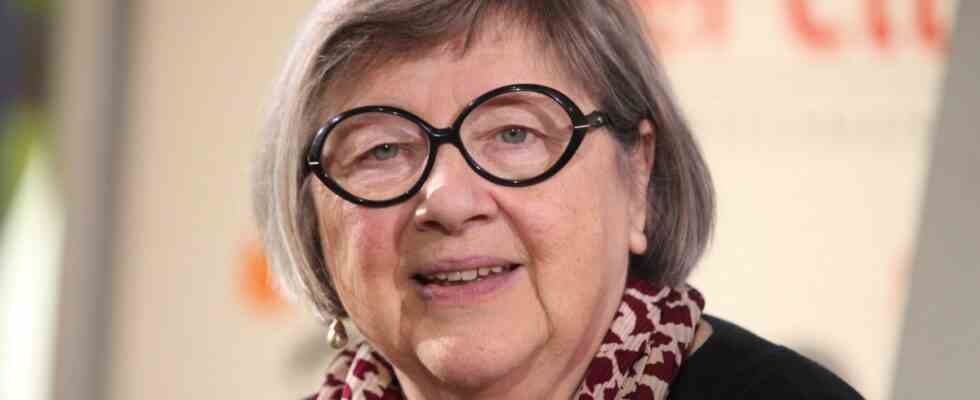In her long life, Sybil Countess Schönfeldt always saw herself as a cultural mediator. As a journalist, she learned right from the start, shortly after the war, as editor of letters to the editor at Bauer Verlag in Hamburg, what made people buy a newspaper. The good and the beautiful were not in demand in the post-war period, it was a matter of finding one’s way in a new society: “These experiences corrected my university arrogance,” said Sybil Countess Schönfeldt.
But that didn’t stop her from researching her topics in detail. Schönfeldt has become known to several generations of readers as an author, translator and literary critic. One of her greatest book successes remains “Knaur’s Big Baby Book”, for which she volunteered in a gynecological clinic. And what she needed to know for her famous articles and books about cooking, she acquired in the Maizena company’s test kitchen. On many German kitchen shelves today are books with titles such as “Cookbook for the big old man” or “Cookbook for the little old woman”, the texts of which she garnished with memories from her own life. They also played a major role in their behavior books, for example the “Basics of good manners”. Her critics found her dining and etiquette rules bourgeois old-fashioned, but overlooked how liberally the author described good manners as an unspoken agreement that we make ourselves, a convention that also changes daily. In the 1980s, Sybil Countess Schönfeldt later recalled, she encountered harsh rejection with her topic: “If your name is Countess, people have a completely wrong image of you.”
Schönfeldt was born in 1927 as the daughter of an Austrian imperial count. Her mother died shortly after she was born, and the girl grew up with her grandparents and great-aunts in Nassau. Anecdotes from her large family and experiences with her father, who worked as press spokesman for the UFA in Berlin, appear in many of her books.
“When art is at the service of a cause, often neither one nor the other wins”
At the age of seventeen she was drafted into the Reich Labor Service. Her autobiography “Sonderappell”, which was published in 1979, is a reckoning with the Nazi period and the drill of the girls in this institution. After the end of the war, their labor service leaders and functionaries were not held accountable and violently attacked Schönfeldt, even preventing the book from being made into a film. Sybil Countess Schönfeldt described her development from a staunch Hitler supporter to a political author who was ashamed of not having recognized the horrors of the regime sooner. As a literary critic, she later dealt in particular with books dealing with the Holocaust.
After the war, Countess Schönfeldt studied German and art history and did her doctorate on “formal problems in the poetry of Josef Weinheber”. In 1952 she volunteered at Goettingen daily newspaperand when it subsequently arrived in the Hamburg press landscape, soon for The time and wrote their magazine, it was Paul Hühnerfeld, then the arts editor at the time, who commissioned her, as one of the few women on the editorial staff, to report on the newly established youth book prize. Together with Hühnerfeld, she established the children’s and youth literature criticism in the weekly newspaper. These were the years when major children’s book publishers such as Dressler, Oetinger, Klopp, Ravensburger, and dtv junior were run by women, and Countess Schönfeldt became an important figure in this scene.
In 1957 she married the businessman Heinrich Schlepegrell and gave up a permanent job to raise her two sons, including a position in the editor-in-chief of the magazine Constanze. She remained a freelancer all her life and saw this way of life as a great opportunity, especially for female journalists. She herself became a juror and chairwoman of the Children’s and Young People’s Book Prize and the Working Group for Young People’s Literature. Among other things, she worked for starthe Hamburg evening paper and the NDR and continued to write columns and reviews on youth book topics. From 1969 she also teamed up with Barbara Bondy, who was then in charge of the weekend edition of the SZ, and wrote for the children’s and young adult book pages in the arts section of this newspaper to the end.
In addition, her biography of Astrid Lindgren was written, the first in German, and Schönfeldt also translated important literature from English. It ended up being 120 books by authors such as Edith Nesbit, Pearl S. Buck, Charles Dickens and Lewis Carroll.
Her unerring sense of language also made her critical of the anti-authoritarian literature of the 1970s. Her credo was: “When art is at the service of a cause, neither one nor the other often wins”. Exceptions were possible if she sensed literary quality, for example with Friedrich Karl Wächter. But she remained skeptical when didactics and socio-pedagogical intentions were too clear, as is often the case in children’s and youth literature. She also defended herself against age restrictions and advocated giving children full responsibility for thinking.
The older she got, the more she demanded of herself to continue working with Prussian discipline despite poor health: “Once you let yourself go, you’re lost”. She knew to the end “that everyone has their own world in their heads and that’s why they can be happy.” Sybil Countess Schönfeldt died in Hamburg on December 14, 2022 at the age of 95.

